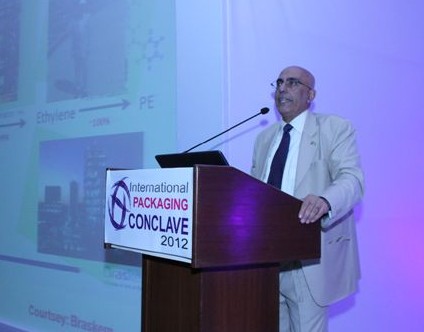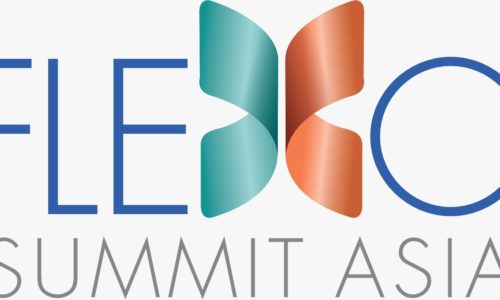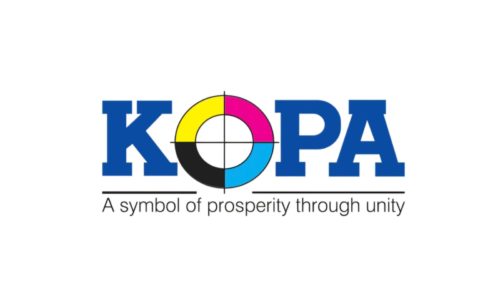International Packaging Conclave 2012, the residential programme positioned as a smart knowledge sharing and networking event, recorded huge success with 110 delegates. Focused on its theme ‘Integration and Collaboration across Packaging Value Chain’, the Conclave was held on 8 December 2012 at Radisson Blu, Greater Noida, running parallel with the second day of PackPlus Exhibition.
Starting with a brief background on PackPlus exhibition and conferences, Debabrata Deb, Consultant, Packaging Technology & Director, Future Formats welcomed the speakers and the delegates to the global knowledge sharing platform.

Prof. Ramani Narayan, Distinguished Professor, Michigan State University, a known name in the world of biopolymers took over the dais as the key note speaker of the day. He shared his insight into using biobased carbon content and end-of-life options (biodegradability-compostability & recycling) for sustainable packaging. Sustainability, according to him, is a closed loop biological or chemical cycling of materials & nutrients – driving to zero waste solutions.
The first panel discussion focused on ‘Packaging Solutions- Benefits of Integration & Collaboration across the Value Chain’ was moderated by Sameer Mehendale, Associate VP- Packaging Development, Kraft Foods. Need of the FMCG industry was emphasized. Bimal Lakhotia, National Head- Packaging Development & Commercialization, Hindustan Coca Cola Beverages (P) Ltd. started off the discussion highlighting the need for integration and collaboration. “The objective of integration is to create a seamless, synchronized and inclusive value chain ensuring process design which allows the best possible material flow / end delivery,” he said.
Prabuddha Dasgupta, Consultant, ITW India Ltd. shared his insight into sustainability in packaging with a case study of the tea industry supply chain and the difference made by vacuum packaging during bulk storage resulting from a holistic approach.Beginning with the evolution of packaging market globally and in India, Karam Vir Rehani, Automation Consultant, KVR Consulting said that the evolving Markets of India has ample opportunities for the stake holders. “The business pressure will drive the need for integration. There is a need for collaborative working by forging links with packing machine OEMs & control system suppliers,” he stated. However, he cautioned about attitudes and emphasized the need for a change in mindset to bring about collaboration.
Umesh Padmasali, AGM – OEM Marketing, Schneider Electric concluded the first panel discussion presenting a case study (integration of tube filling and cartooning) on challenges faced during line integration. “The customer demand will drive the need for integration. Key factors will be the innovation, cost reduction, scalability, increased performance, ease of programming and training & support,” he said.

The second panel discussion, moderated by Anup Wadhwa, Director, Automation Industry Association (AIA), focused on ‘Future Demands on Automation for Packaging Lines – Open Technology is the Answer’. He initiated the discussion raising issues like bringing speed, safety & maintenance on the same side of performance; building capability to apply & support automation hardware & software and making a conscious choice to embrace a universal OPEN standard.
The session started with a presentation by Satish Ansingkar, Vice President- Sales, B & R Industrial Automation (P) Ltd., on automation’s role in the packaging industry and future trends in automation. “The existing situation is that people purchase machines from many suppliers around globe and integrate them to create a packing line system. This raises problems like no software consistency between machines or machines from same OEM, time consuming horizontal & vertical integration, training challenges for operators & technicians and hard to troubleshoot. The solution lies in embracing and deploying industry software standards by arriving at standard platform of templates,” he said.
Maurizio Tarozzi,Global Technology Manager – Packaging Solutions, B & R Industrial Automation (P) Ltd. took over the dais to talk about the Open SAFETY technology. “One safety standard protocol is apt for your entire production plant providing you with cost reduction, less down-time, higher productivity and easy maintenance,” he stated. He illustrated concepts with the case study of a bottling line.

Introducing the revolutionary PackML (Packaging Machine Language), Dr. Bryan Griffen, Electrical & Automation Engineering Manager / Chairman Nestle / OMAC Packaging Workgroup (OPW), spoke on value and benefits of the technology. Presenting the key benefits of compliance with PackML, he said, “The benefit to end users will be in terms of consistent data & control structure for integration both horizontally (machine-to-machine) or vertically (machine-to-SCADA/MES) and reduced total cost of ownership (TCO). For the machine builders, it allows the OEM to select the technology platform that will best suit their needs, gives simplified post-sale support and protects intellectual property. The system integrators get consistency when working with multiple automation platforms & OEMs and the focus comes on value-added activities such as MES, maintenance tools, etc. instead of integration concerns. The technology providers focus on competitive advantages instead of integration issues.” Bryan invited the industry to take forward the concept of PackML.
Concluding the second panel discussion, Mahabaleshwara B.L., Senior Manager- E&A, Nestle India Ltd. gave a presentation on packaging automation – the end user perspective and expectation.
The third and the last panel discussion of the Conclave moderated by Rakesh Shah, Managing Director, Windmoller & Holscher India Pvt. Ltd., presented approaches and case studies on sustainability- the future imperative. Prof. Ramani Narayan continuing with his extensive knowledge on bioplastics explained several concepts of the subject. “Biobased plastics are the ones made from biomass/plant feedstocks as opposed to petro/fossil feedstocks. Biodegradable-compostable plastics are designed to be completely biodegradable in the targeted disposal environment (composting, soil, marine, anaerobic digestor) in a short defined time period. And additive based plastics are oxo and organic additives added at 1-2% levels to conventional polyethylenes (PE), polypropylene (PP), polystyrene (PS), polyethylene terephthalate (PET) and other plastics that are claimed to make them biodegradable,” he explained. He gave a precise definition of biodegradability.
Dr. U.K. Saroop, Vice President- Business Development, Reliance Industries Ltd. presented several case studies favoring resource conservation. He gave the example of packaging health powders and UHT Milk where glass and PET bottles have been replaced by transparent light weight PP containers. He also gave the example of bulk potato storage in cold storages wherein PP Leno Bags are giving superior shelf life and strength performance compared to the traditional jute bags at a lower cost.
Further in the discussion, Dr. A.K. Ghosh, Professor- Centre for Polymer Science & Engineering, Indian Institute of Technology (IIT) spoke on the critical importance of life cycle analysis, Sukhdev Singh Saini, Senior Manager- Packaging Development – Wellness & Oral care, GlaxoSmithKline Consumer Healthcare Ltd. talked about the importance of increasing awareness among the consumers. He gave the example of the reusable shopping bag. Vijay Bhujle, Head- Intertek Expert Services, Intertek India (P) Ltd. gave an insight into the various softwares used for life cycle analysis which can simulate different outcomes with the carbon footprint of each outcome.

Mahendra N.Patel, Chairman, Mamata Group took over the dais to give the Conclave roundup. Sharing his thoughts on sustainability, he said that plastic continues to be one of the most sustainable forms of packaging and its application should be encouraged. Talking about the new innovations in the industry, he said that Mamata Group would look into the benefits of PackML for integration. He also encouraged more transparency in the whole line integration approach for better outcomes. He emphasized transparency is as much required in the private sector as in the Government and public sectors. His speech was challenging and thought provoking.
The event was followed by a networking cocktail and dinner where the sharing of knowledge and experience continued among the speakers & delegates in an informal ambience.
The overwhelmed response received by the Conclave has already set the foundation stone for International Packaging Conclave 2013, to be held on 5 October at Greater Noida, where subjects pertaining to the industry will be discussed at length. We invite ideas! What about “Sustainable, Consumer Friendly, Elegant Packaging Design” as a theme for this year?
To view image gallary log on to- http://www.packplus.in/IPConclave.htm
For more details, write to us at neha@print-packaging.com



